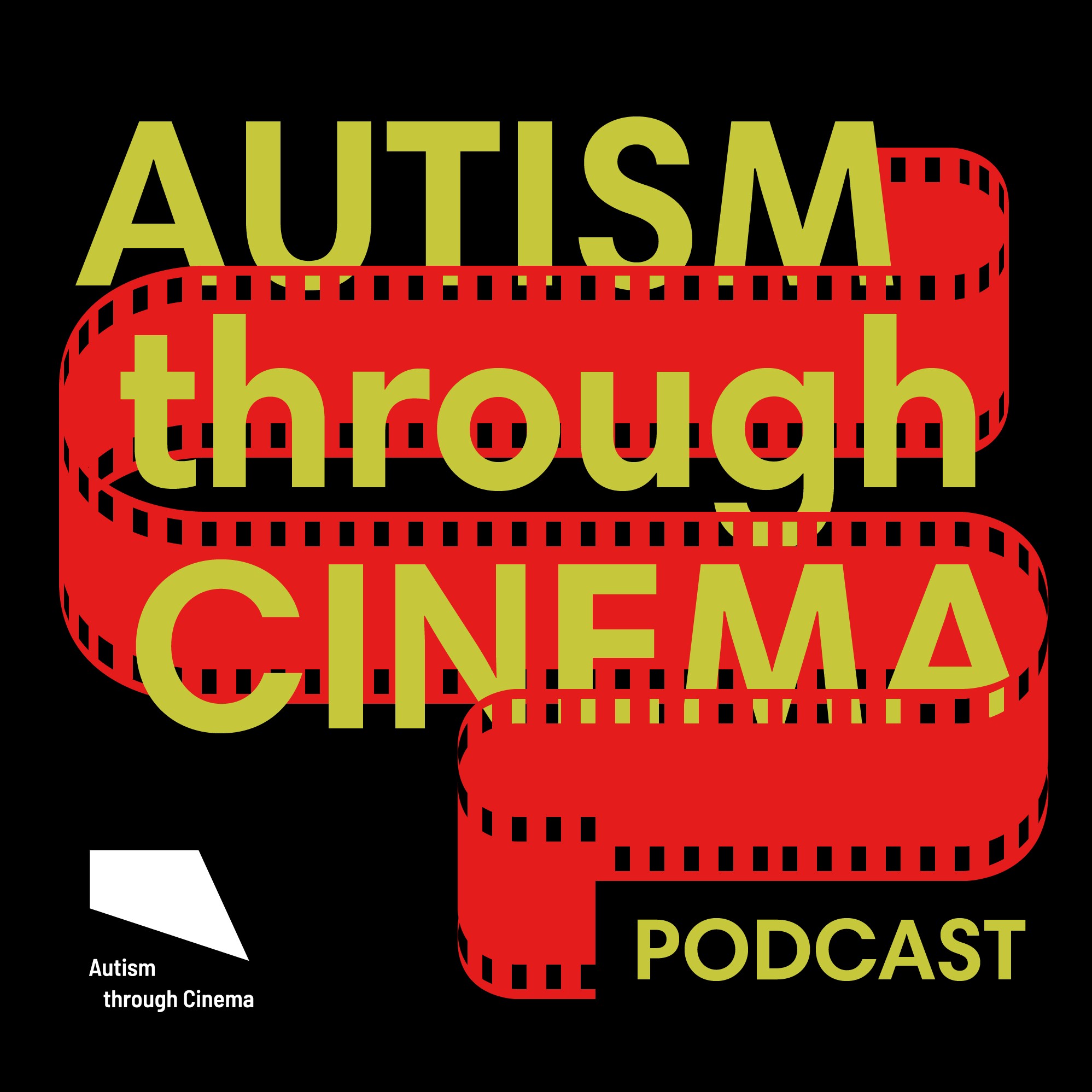
Investigating autistic presence and expression on film and TV. We push beyond the obvious and seek out autistic themes and concerns in films from across the cinematic spectrum. We consider the ethics of performing autism, while also celebrating the autistic pleasures offered by the camerawork and the soundscapes. We delve into the works of cult directors who have hit upon an autistic way-of-seeing, perhaps without ever intending to. We entertain new possibilites for re-thinking beloved films in a neurodivergent light. Join regular contributors Janet Harbord, Georgia Bradburn, John-James Laidlow, David Hartley and Alex Widdowson for their fascinating and diverting discussions of a whole suite of suprising and challenging films. This podcast is brought to you by the Autism Through Cinema project, based at Queen Mary, University of London and funded by the Wellcome Trust. For further information on the wider project, visit our website at autism-through-cinema.org.uk and follow us ...
Investigating autistic presence and expression on film and TV. We push beyond the obvious and seek out autistic themes and concerns in films from across the cinematic spectrum. We consider the ethics of performing autism, while also celebrating the autistic pleasures offered by the camerawork and the soundscapes. We delve into the works of cult directors who have hit upon an autistic way-of-seeing, perhaps without ever intending to. We entertain new possibilites for re-thinking beloved films in a neurodivergent light. Join regular contributors Janet Harbord, Georgia Bradburn, John-James Laidlow, David Hartley and Alex Widdowson for their fascinating and diverting discussions of a whole suite of suprising and challenging films. This podcast is brought to you by the Autism Through Cinema project, based at Queen Mary, University of London and funded by the Wellcome Trust. For further information on the wider project, visit our website at autism-through-cinema.org.uk and follow us ...
Episodes
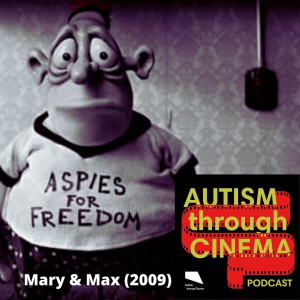
Friday Oct 01, 2021
Friday Oct 01, 2021
In this very animated episode, the team turn their attention to a pair of SparkShorts from Pixar that deal directly with autistic experience; Float (2019) by Bobby Rubio, and Loop (2020) by Erica Milsom. Followng this, they pull apart the imagery, metaphors and characters of Adam Elliot's stop-motion feature length film Mary and Max (2009). They consider what animated film can do for the depiction of autism that is not as easily acheived in live-action, while also debating the ethics of working in collaboration with real autistic individuals. Loop, for example, features the vocal contributions of minimally verbal actor Madison Bandy, while Mary and Max was directly inspired by Elliot's real-life autistic penpal. We also consider the depiction of trauma, the relationship between autism and age, and the use of caricature and the grotesque.
In this episode you hear Janet Harbord, Alex Widdowson, John-James Laidlow, Georgia Bradburn and David Hartley.
For more on the Autism Through Cinema project, check out our website: https://www.autism-through-cinema.org.uk/. Follow us on Twitter at @AutismCinema, and send us messages on cinemautism[at]gmail.com
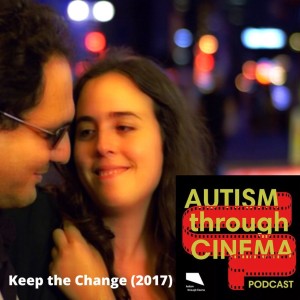
Friday Sep 17, 2021
Keep the Change (2017) dir. Rachel Israel
Friday Sep 17, 2021
Friday Sep 17, 2021
We've addressed concerns in past episodes about autistic characters being portrayed by non-autistic actors. Well here, with Rachel Israel's romantic drama Keep the Change, we get the opportunity to enjoy a film with a predominantly autistic cast. Brandon Polansky plays David, an aspiring filmmaker whose life takes an unexpected turn when he's assigned a partner from his Community Centre workshop in the form of the vivacious and energetic Sarah, played by Samantha Elisofon. We find the presence of non-professional autistic actors to be a refreshing and exciting change from the norm, while also delighting in the representation of autistic individuals as deeply emotional and romantic. There were some concerns about how we were supposed to relate to David as a character who makes a number of distasteful decisions, but we were utterly charmed by his beau, Sarah, played with such energy and verve by Elisofon. We consider the representation of learning difficulties in relation to Sarah's misunderstanding of jokes, as well as the exploration of autism in relation to gender.
Keep the Change is being screened as part of our Autism and Cinema season on Tuesday 28th September at 6pm. There will be a talk hosted by Steven Eastwood and the Neurocultures Collective afterwards, and tickets are still available on the Barbican website: https://www.barbican.org.uk/whats-on/2021/event/keep-the-change-screentalk
If you have any thoughts or comments about this episode, feel free to email us on cinemautism@gmail.com
On this episode you hear David Hartley, Janet Harbord, Georgia Bradburn and Alex Widdowson
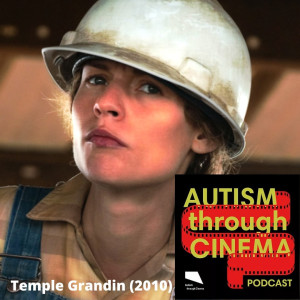
Friday Sep 03, 2021
Temple Grandin (2010) dir. Mick Jackson
Friday Sep 03, 2021
Friday Sep 03, 2021
In Mick Jackson's TV film Temple Grandin, Claire Danes shines in the title role, portraying one of the world's most famous autistic women. Temple is shown to be a formidable force of nature as she takes on the professors of her college, and the workers of the feedlot where she will eventually design her famous cattle chute system. We discuss how the film makes use of animation techniques to offer a visualisation of Temple's way of 'thinking in pictures', although we reserve concerns that this may essentialise autism a little too much. We consider Temple in relation to her gender as a strong female character in many very masculine environments, and what impression this leaves us for thinking through autistic femininity.
Temple Grandin will be screened on the 16th September at our Autism and Cinema season at the Barbican, London. The film will be followed by a short pre-recorded interview with the real Temple, and then a Q&A with podcast host Dr David Hartley, and Dr Bonnie Evans, author of The Metamorphosis of Autism. Tickets are free and can be bought from the Barbican website: https://www.barbican.org.uk/whats-on/2021/event/temple-grandin-pg-screentalk
If you have enjoyed this episode, please leave us a comment or feedback, or get in touch on cinemautism[at]gmail.com
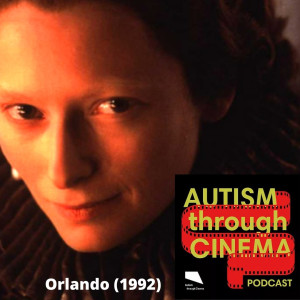
Friday Aug 20, 2021
Orlando (1992) dir. Sally Potter
Friday Aug 20, 2021
Friday Aug 20, 2021
The podcast takes a queer turn as we link up with Sally Potter and Tilda Swinton and Virginia Woolf through Potter's exuberent time-bending period drama, Orlando. We enjoy the film's take on the artifice of society, which we connect with the autistic way of viewing the often nonsensical neurotypical world. Swinton's intimate fourth-wall-breaking gaze befriends the autistic viewer in a wry nod of collaboration, but also evokes the spectre of eye-contact which has such an emblematic status in the world of autism. We also take some time to reflect on the theory of the 'neuroqueer', as explored by Remi Yergeau's influential book Authoring Autism and Nick Walker's blog neuroqueer.com, via the film's timeless questioning of gender binaries and boundaries.
If you have any thoughts or comments on this episode, send us an email at cinemautism@gmail.com
In today's episode you heard Georgia Bradburn, John-James Laidlow, David Hartley, and Janet Harbord.
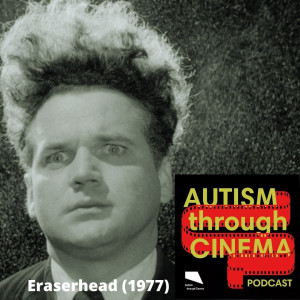
Friday Aug 06, 2021
Eraserhead (1977) & The Grandmother (1970) dir. David Lynch
Friday Aug 06, 2021
Friday Aug 06, 2021
This week, Georgia can barely contain her excitement about making us watch not one but two David Lynch films. We get up close with the angst-ridden Henry of Lynch's debut feature film Eraserhead while taking a brief detour through his earlier short film 'The Grandmother' from 1970. We wonder whether Lynch is contrary for the sake of being contrary, or if there's some deeper expression of divergence going on in his weird and wonderful worlds. We enjoy both films for their take on the idea of 'matter out of place' - a phrase which asks us to question why certain substances and fluids are considered dirty or taboo. However, we also tackle some darker and more difficult areas including incest, child abuse, and violence - so do proceed through this episode with caution.
It's worth noting that we will be screening Lynch's Mulholland Dr. (2000) at our Autism and Cinema season at the Barbican in September. The event will be preceded by an introduction from Georgia herself, and tickets can be grabbed via the Barbican website: https://www.barbican.org.uk/whats-on/2021/event/mulholland-drive-15-introduction
Your hosts for this episode are David Hartley, Janet Harbord, John-James Laidlow, Alex Widdowson and Georgia Bradburn.
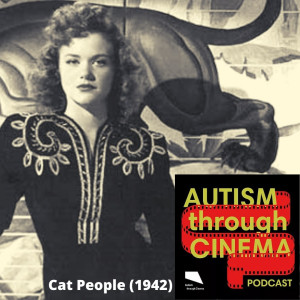
Friday Jul 23, 2021
Cat People (1942) dir. Jacques Tourneur
Friday Jul 23, 2021
Friday Jul 23, 2021
We welcome special guest PhD student Ethan Lyon to the podcast, who brings along the 1942 horror classic Cat People for our scrutiny. Starring Simone Simon in the lead role, this moody horror noir folows Serbian immigrant Irena who believes herself to be a descendant of an ancient tribe of persecuted people who metamophorsize into bloodthirsty panthers when aroused. Ethan asks us to consider whether Irena might be understood through the lens of autism as a societal outsider who struggles with a number of sensory challenges, while forever under the scrutiny of the psychoanalytic gaze. We also discuss the legacies of historical events upon a person's identity, the Gothic in relation to the construction of mental health, and the often whimsical association of cats with autism, and dogs with neurotypicality.
Huge thanks to Ethan for joining us for this episode. The other discussants here are Alex Widdowson, Janet Harbord, David Hartley, Georgia Bradburn and John-James Laidlow.
As ever, please send your thoughts and comments to cinemautism@gmail.com
----
For tickets to our Barbican season 'Autism and Cinema', please follow this link: https://www.barbican.org.uk/whats-on/2021/series/autism-and-cinema-an-exploration-of-neurodiversity
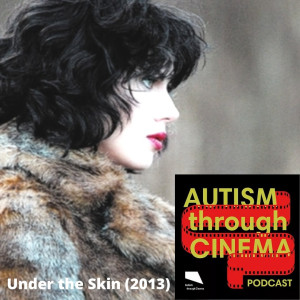
Friday Jul 09, 2021
Under the Skin (2013) dir. Jonathan Glazer
Friday Jul 09, 2021
Friday Jul 09, 2021
A sci-fi film, based on Michel Faber’s novel and set in Glasgow, follows Scarlet Johansson as a nameless alien recently arrived on earth to prey on men and harvest their organs. The discussion considers whether Johansson’s character offers an outsider’s view of neurotypicality that is close to that of autism, looking on at a world of perplexing social rituals of seduction and consumption, or whether a suggested affinity between autism and a character who is alien is problematic. Also debated are the topics of posthumanism, feminist alien abduction of the male species, the film’s ethnographic style of filming ‘humankind’, Glasgow and white working-class culture, compassion between male characters, and the exploration of sexuality and gender as alien concepts.
Discussants: Georgia Kumari Bradburn, Janet Harbord, David Hartley, John-James Laidlow, Alex Widdowson.
Email us your insights at: cinemautism@gmail.com
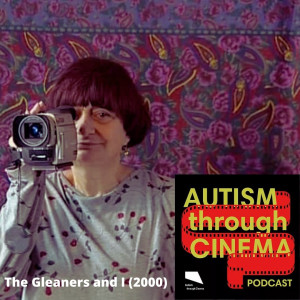
Friday Jun 25, 2021
The Gleaners and I (2000) dir. Agnes Varda
Friday Jun 25, 2021
Friday Jun 25, 2021
Varda’s film explores the history and contemporary practices of gleaning (picking up leftovers after the act of harvesting), putting digression at the centre of its approach. Following wherever intuition and coincidence lead, the film becomes a non-linear accumulation of stories and objects. The discussion considers whether Varda is a trickster figure in her style of striking up ‘stranger familiarity’, and whether it is a film of peripheral outsiders or a display of how different people are everywhere. A particular resonance with autism is its celebration of monotropism and special interests, which leads to a debate of whether filmmaking in itself can be seen as a type of autistic hyper-focus.
Discussants: Alex Widdowson, David Hartley, Georgia Kumari Bradburn, Janet Harbord, John-James Laidlow, & Vicky Thonton.
Email us your reactions to cinemautism@gmail.com
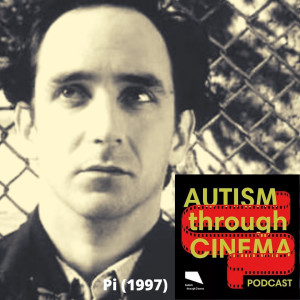
Friday Jun 11, 2021
Pi (1998) dir. Darren Aronofski
Friday Jun 11, 2021
Friday Jun 11, 2021
Aronofsky’s first feature film is discussed in terms of its closeness to autistic meltdown, an affect that appears rarely in film, driven by the character’s fascination with patterns, a propensity for maths as the language of the universe and a magical number. Computers feature heavily in the film, debated as either a potentially problematic alliance between autism and automatism, or possibly autistic attention to the material world and its many capacities. The film’s ending proves controversial: does it suggest that lobotomy is the only way to end suffering for Max, that there is no place in this world for neurodiversity?
Discussants: Georgia Bradburn, Janet Harbord, David Hartley, Alex Widdowson.
Email us your thoughts at cinemautism@gmail.com
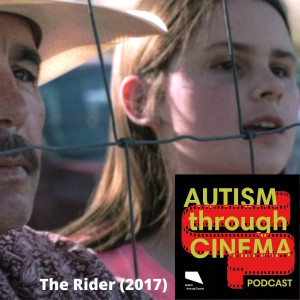
Friday May 28, 2021
The Rider (2017) dir. Chloe Zhao
Friday May 28, 2021
Friday May 28, 2021
The discussion of Chloé Zhao’s second feature film addresses the fine line between fact and fiction with actors playing themselves. We debate whether autistic sister Lily (Lily Jandreau) is the only free character in this western set in the badlands of South Dakota, resistant to the demands of the hyper-masculine patriarchal world of rodeo and refusing the trappings of femininity by cutting up a bra her father buys her. There’s also debate about whether difference is drafted into the film as story markers or plot points, the problematic treatment of animals (particularly horses), and the potentially cliched idea that there’s affinity between animals and autistic people.
It's also worth noting that this episode was recorded before Zhao won the Best Picture and Best Director Academy Awards for Nomadland (2020), just in case you were wondering why we don't mention it!
Discussants: Georgia Bradburn, Steven Eastwood, Janet Harbord, David Hartley, Alex Widdowson.
